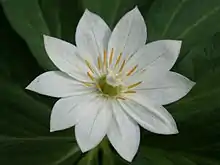| Paris japonica | |
|---|---|
 | |
| Flowers and leaves | |
 | |
| Close-up of flower | |
| Scientific classification | |
| Kingdom: | Plantae |
| Clade: | Tracheophytes |
| Clade: | Angiosperms |
| Clade: | Monocots |
| Order: | Liliales |
| Family: | Melanthiaceae |
| Genus: | Paris |
| Species: | P. japonica |
| Binomial name | |
| Paris japonica | |
| Synonyms | |
| |
Paris japonica (キヌガサソウ, Kinugasasō, canopy plant) is a Japanese species of plants in the genus Paris in the family Melanthiaceae.[1]
It is native to sub-alpine regions of Japan. A slow growing perennial, it flowers in July. The rare, showy white star-like flower is borne above a single whorl of about eight stem leaves. It prefers cool, humid, shady places.
Genetics
Paris japonica has the largest genome of any plant yet assayed, about 150 billion base pairs long. An octoploid and suspected allopolyploid hybrid of four species, it has 40 chromosomes. With 150 billion base pairs of DNA in the haploid genome (50 times larger than that of a human haploid genome).[2][3] Paris japonica may possess the largest known genome of any living organism.
The flower has 19 billion more base pairs than the previous record holder, the marbled lungfish, whose 130 billion base pairs weigh in at 132.83 picograms per cell.[2][3] Since then, other organisms have been assayed and reported to have larger genomes; Polychaos dubium may be the current record holder, but the authors of one study suggest treating that measurement with caution because it was taken before the advent of modern genomic methods.[4]
References
- ↑ Ohwi, J. (1984). Flora of Japan (in English): 1-1067. Smithsonian Institution, Washington, D.C.
- 1 2 Pellicer, Jaume (1 September 2010). "The largest eukaryotic genome of them all?". Botanical Journal of the Linnean Society. 164 (1): 10–15 – via Oxford Academic.
- 1 2 ScienceDaily, Rare Japanese plant has largest genome known to science, Royal Botanic Gardens, Kew, October 7, 2010
- ↑ McGrath, Casey L. & Katz, Laura A. (2004). "Genome diversity in microbial eukaryotes". Trends in Ecology & Evolution. 19 (1): 32–38. doi:10.1016/j.tree.2003.10.007. PMID 16701223.
External links
 Media related to Paris japonica at Wikimedia Commons
Media related to Paris japonica at Wikimedia Commons Data related to Paris japonica at Wikispecies
Data related to Paris japonica at Wikispecies- Rareplants page